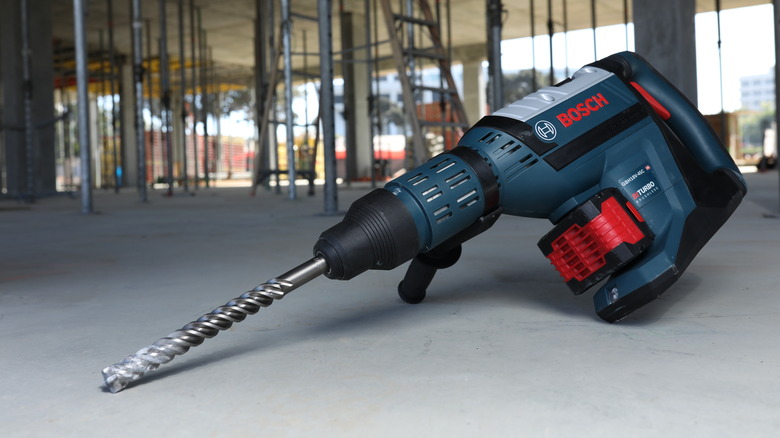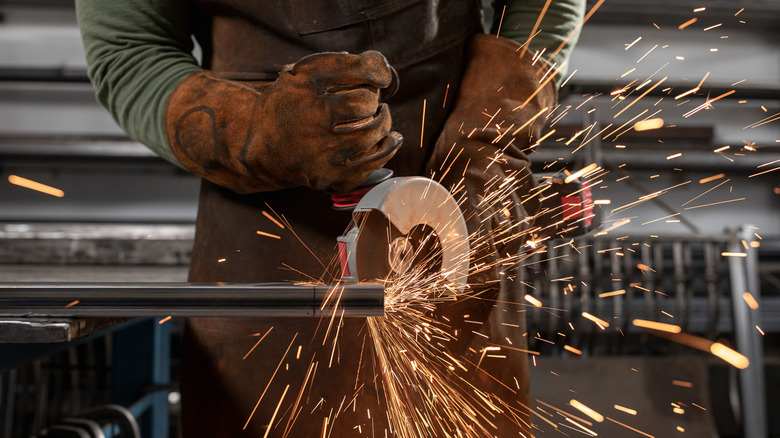What To Know About Bosch Before Investing In Power Tools For Your Home
A lot of things factor into choosing a power tool. Is it powerful enough, durable enough, and cheap enough? How does it feel in the hand? What happens when you drop it in a puddle of water or throw it in a trash bin from across the room? You can fall back on price or reputation, probably both, and Bosch power tools enjoy a reputation for quality that persists even as the competition gets tougher and shelf space gets more scarce. That said, Bosch offers a wide range of tools in some categories, so the quality can vary. As a rule of thumb, you can count on most Bosch tools to be decent for their price points. But, it helps to have some other guidance.
As with most manufacturers, there are certain areas in which Bosch excels. The company offers general tools, including power tools, automotive-specific tools, and home appliances. Within those industries, it seems to do well in categories like tools for working (especially drilling) concrete, rotary hammers (notably its Bulldog line), and dust extractors. The German company's 12-, 18- and 36-volt battery platforms are the subject of much innovation and generally have good shelf lives and fast charging times. The tools have good ergonomics and are often lighter than competitors. That leaves two big issues to examine — price and overall quality, and those are closely related.
Bosch tools are reasonably priced, mostly
If you said Bosch tools are all over the map, you'd have to be looking at a pretty strange map. Generally speaking, Bosch tools are priced within a range that's consistent with competitors like Makita and DeWalt. But, at the lower end of any given tool category (drills, for example), all of those companies offer products that are priced similarly to slightly lower-end options like Ryobi and Bauer.
Sometimes the opposite is true. In a market of sub-$20 stud finders, Bosch sells three priced at $100, $379, and $1,199. Though you may be able to find better deals if you shop around, at those prices, you might choose to go back to finding wall studs with a magnet and string. Even more unusual are the company's only two electric screwdriver offerings, priced at $93 and $129. Those aren't outrageous prices for 12-volt screwdrivers, but the consumer-focused 4-volt screwdrivers at Lowe's are perfectly serviceable and average $30.
From all that, you might conclude that Bosch is serving a professional market. After all, their tagline is "Power Tools for Professionals." But, this isn't consistently the case. Bosch benchtop table saws are priced toward the higher end of the prosumer range, but in many cases, especially in corded tools, they offer options in the middle or lower price points. Again, this isn't altogether unusual, but it does inform what we'll see when we start looking at quality.
With Bosch, you get what you pay for
The big question for a potential Bosch tool buyer remains: Is the company's reputation as a maker of quality power tools deserved? The answer is: Usually, if you're not a cheapskate. Outside of a few narrow categories, it's hard to find Bosch tools that are just plain great. Testing rarely turns up tools that outperform middle-of-the-pack options. Project Farm's testing in four categories (drills, circular saws, stud finders, and electric screwdrivers) mostly turned up products that were mid-range, and when Bosch tools performed better, it seemed to correlate to much higher prices than the competition. Even at the higher performance and price points, the Bosch electric screwdriver was missing almost all of the features common to other brands, including the cheapest electric screwdriver at Home Depot, which we tried and liked. You get what you pay for, except when you don't.
Of course, the best testing will never fully reflect the value of a tool (or its lack of value) to its owner. Teardowns by engineers reveal some problems with design and others with Bosch's Malaysian manufacturers. But, this isn't unusual outside of the rarefied heights of brands like Festool, and even those budget-busters can be disappointing. As a rule, the more you pay — even within a brand — the better the tool will be. Since Bosch tools are priced in the middle-to-upper reaches of the mid-range market, you'll tend to get better-than-average tools that you paid a little more than average for.


